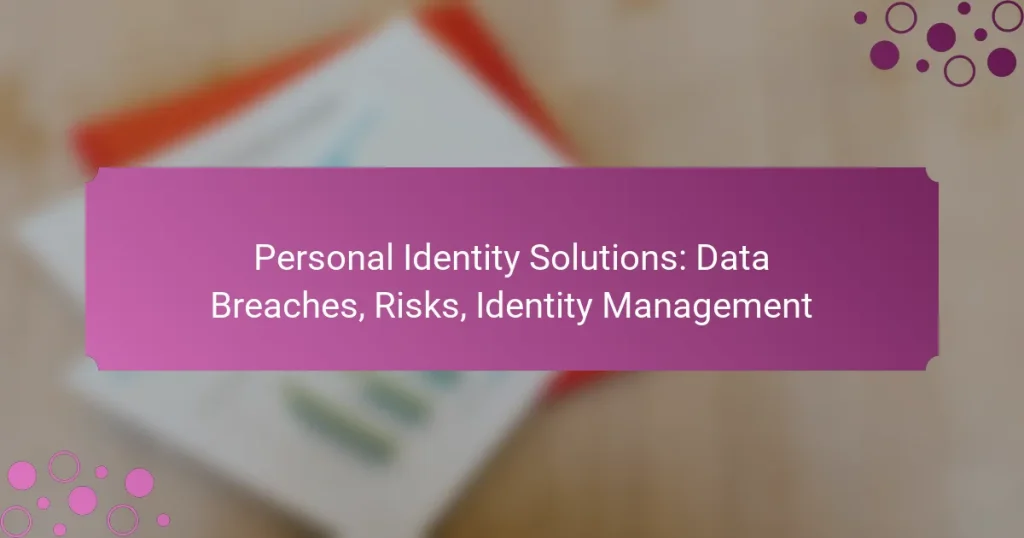In an increasingly digital world, personal identity solutions play a crucial role in protecting individuals from identity theft and managing their sensitive information. With the rise of data breaches, which expose personal data and lead to significant risks, effective identity management has become essential for safeguarding against unauthorized access and potential financial losses.

What are the best personal identity solutions in the UK?
The best personal identity solutions in the UK include a range of services designed to protect individuals from identity theft and manage their personal information securely. These solutions encompass identity theft protection, credit monitoring, and identity verification tools, each serving a specific purpose in safeguarding personal data.
Identity theft protection services
Identity theft protection services help monitor and safeguard your personal information against unauthorized use. These services typically include features such as dark web monitoring, alerts for suspicious activity, and assistance in recovering your identity if it is compromised.
When choosing a service, consider factors like coverage, customer support, and the specific features offered. Popular options in the UK include Experian, Equifax, and Clearscore, each providing different levels of protection and pricing plans.
Credit monitoring services
Credit monitoring services track changes to your credit report and alert you to any unusual activity that could indicate identity theft. These services can help you stay informed about your credit score and report, allowing you to take proactive measures if necessary.
In the UK, many credit monitoring services are available for free or at a low cost. Look for services that offer regular updates, alerts, and access to your credit report, such as Credit Karma or Experian’s free service.
Identity verification tools
Identity verification tools are essential for businesses and individuals to confirm the identity of users before granting access to sensitive information. These tools often utilize biometric data, government-issued IDs, or two-factor authentication to ensure security.
For personal use, consider tools like Yoti or the UK government’s Verify service, which provide secure methods for verifying your identity online. Always ensure that the tools you choose comply with relevant data protection regulations, such as the UK GDPR.

How do data breaches impact personal identity?
Data breaches can severely compromise personal identity by exposing sensitive information, leading to various risks. Individuals may face financial losses and reputational damage as a result of unauthorized access to their personal data.
Financial loss
Financial loss is a significant consequence of data breaches, as stolen information can lead to fraudulent transactions and identity theft. Victims may find unauthorized charges on their accounts, which can range from hundreds to thousands of dollars.
To mitigate financial risks, individuals should regularly monitor their bank and credit card statements for suspicious activity. Utilizing credit monitoring services can also help detect potential fraud early.
Reputational damage
Reputational damage occurs when personal information is leaked, affecting an individual’s credibility and trustworthiness. This can impact professional relationships, job prospects, and personal connections.
To protect against reputational harm, individuals should be proactive in managing their online presence. Regularly updating privacy settings on social media and being cautious about the information shared online can help maintain a positive reputation.

What are the risks associated with identity management?
The risks associated with identity management primarily involve unauthorized access and data misuse. These risks can lead to significant consequences for individuals and organizations, including financial loss and reputational damage.
Unauthorized access
Unauthorized access occurs when individuals gain entry to systems or data without permission. This can happen through various means, such as weak passwords, phishing attacks, or exploiting software vulnerabilities.
To mitigate unauthorized access, organizations should implement strong authentication methods, such as multi-factor authentication (MFA). Regularly updating passwords and conducting security audits can also help identify potential weaknesses.
Data misuse
Data misuse refers to the improper use of personal information, which can occur internally or externally. Employees may unintentionally mishandle sensitive data, or external actors may exploit stolen information for fraudulent activities.
To prevent data misuse, organizations should establish clear data handling policies and provide training for employees on data privacy. Regular monitoring of data access and usage can help detect and address any irregularities promptly.

How to choose an identity management solution?
Choosing an identity management solution involves evaluating its security features, customer support, and overall usability. Prioritize solutions that align with your specific needs and compliance requirements to protect your personal data effectively.
Assess security features
When assessing security features, look for solutions that offer robust encryption, multi-factor authentication, and regular security updates. These elements help safeguard your identity against data breaches and unauthorized access.
Consider solutions that comply with industry standards such as GDPR or CCPA, as these regulations ensure a baseline of protection. Additionally, review user feedback and expert reviews to gauge the effectiveness of the security measures in real-world scenarios.
Evaluate customer support
Effective customer support is crucial for resolving issues quickly and ensuring smooth operation of your identity management solution. Check if the provider offers 24/7 support, multiple contact methods (like phone, chat, and email), and a comprehensive knowledge base.
Look for solutions with positive customer reviews regarding their support services. A responsive support team can significantly reduce downtime and enhance your overall experience with the identity management system.

What are the key attributes of effective identity management?
Effective identity management involves ensuring that only authorized users have access to sensitive information and systems. Key attributes include robust authentication methods, data protection mechanisms, and continuous monitoring of user activities.
Multi-factor authentication
Multi-factor authentication (MFA) enhances security by requiring users to provide two or more verification factors to gain access. This can include something they know (like a password), something they have (like a smartphone), or something they are (like a fingerprint).
Implementing MFA significantly reduces the risk of unauthorized access, as it adds layers of protection. For example, even if a password is compromised, the additional verification step can prevent breaches.
Organizations should consider using MFA solutions that comply with industry standards, such as the NIST guidelines, to ensure a high level of security while maintaining user convenience.
Data encryption
Data encryption protects sensitive information by converting it into a coded format that can only be read by authorized users with the correct decryption key. This is crucial for safeguarding data both at rest and in transit.
When implementing encryption, organizations should use strong algorithms, such as AES-256, and ensure that encryption keys are managed securely. Regular audits and updates to encryption protocols are essential to maintain data integrity.
Additionally, compliance with regulations like GDPR or HIPAA may require specific encryption practices, making it vital for businesses to stay informed about legal obligations related to data protection.

What are the emerging trends in identity management?
Emerging trends in identity management focus on enhancing security and user control while streamlining verification processes. Key developments include AI-driven identity verification and decentralized identity solutions, both aimed at reducing fraud and improving user experience.
AI-driven identity verification
AI-driven identity verification utilizes machine learning algorithms to analyze user data and behavior for authentication purposes. This technology can assess biometric data, such as facial recognition or fingerprints, alongside traditional identifiers like passwords, enhancing security and reducing the risk of identity theft.
Organizations implementing AI-driven verification should consider the balance between security and user convenience. While AI can significantly reduce fraud, it may also introduce privacy concerns, necessitating compliance with regulations like GDPR in Europe or CCPA in California.
Decentralized identity solutions
Decentralized identity solutions empower users to control their personal information without relying on a central authority. By using blockchain technology, individuals can manage their identities securely and share only necessary data with service providers, minimizing the risk of data breaches.
When adopting decentralized identity solutions, businesses should evaluate the trade-offs between user autonomy and the complexity of implementation. While these systems can enhance privacy and security, they may require significant changes to existing infrastructure and user education to ensure effective use.


